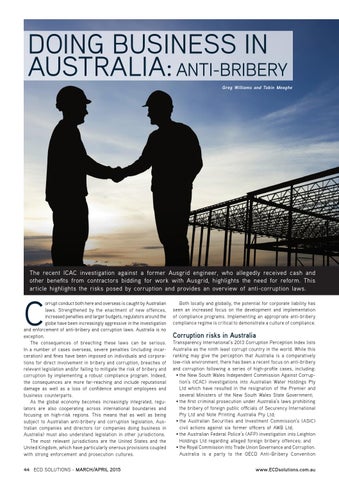DOING BUSINESS IN AUSTRALIA: ANTI-BRIBERY Greg Williams and Tobin Meaghe
The recent ICAC investigation against a former Ausgrid engineer, who allegedly received cash and other benefits from contractors bidding for work with Ausgrid, highlights the need for reform. This article highlights the risks posed by corruption and provides an overview of anti-corruption laws.
C
orrupt conduct both here and overseas is caught by Australian laws. Strengthened by the enactment of new offences, increased penalties and larger budgets, regulators around the globe have been increasingly aggressive in the investigation and enforcement of anti-bribery and corruption laws. Australia is no exception. The consequences of breaching these laws can be serious. In a number of cases overseas, severe penalties (including incarceration) and fines have been imposed on individuals and corporations for direct involvement in bribery and corruption, breaches of relevant legislation and/or failing to mitigate the risk of bribery and corruption by implementing a robust compliance program. Indeed, the consequences are more far-reaching and include reputational damage as well as a loss of confidence amongst employees and business counterparts. As the global economy becomes increasingly integrated, regulators are also cooperating across international boundaries and focusing on high-risk regions. This means that as well as being subject to Australian anti-bribery and corruption legislation, Australian companies and directors (or companies doing business in Australia) must also understand legislation in other jurisdictions. The most relevant jurisdictions are the United States and the United Kingdom, which have particularly onerous provisions coupled with strong enforcement and prosecution cultures.
44 ECD SOLUTIONS - MARCH/APRIL 2015
Both locally and globally, the potential for corporate liability has seen an increased focus on the development and implementation of compliance programs. Implementing an appropriate anti-bribery compliance regime is critical to demonstrate a culture of compliance.
Corruption risks in Australia Transparency International’s 2013 Corruption Perception Index lists Australia as the ninth least corrupt country in the world. While this ranking may give the perception that Australia is a comparatively low-risk environment, there has been a recent focus on anti-bribery and corruption following a series of high-profile cases, including: • the New South Wales Independent Commission Against Corruption’s (ICAC) investigations into Australian Water Holdings Pty Ltd which have resulted in the resignation of the Premier and several Ministers of the New South Wales State Government; • the first criminal prosecution under Australia’s laws prohibiting the bribery of foreign public officials of Securency International Pty Ltd and Note Printing Australia Pty Ltd; • the Australian Securities and Investment Commission’s (ASIC) civil actions against six former officers of AWB Ltd; • the Australian Federal Police’s (AFP) investigation into Leighton Holdings Ltd regarding alleged foreign bribery offences; and • the Royal Commission into Trade Union Governance and Corruption. Australia is a party to the OECD Anti-Bribery Convention
www.ECDsolutions.com.au
